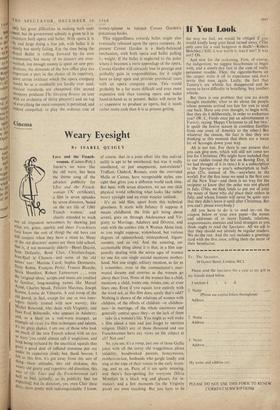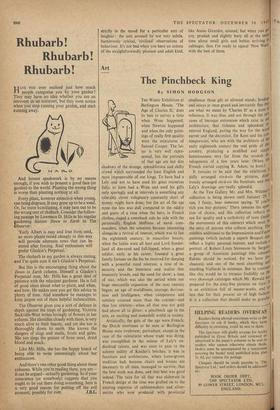Cinema Weary Eyesight By ISABEL QUIGLY
Timati's no wave like the old wave, has been the theme song of the advance publicity for Me and the • French- woman CX' certificate), a film in seven episodes by seven directOrs, 'based on the sex life of 1,001 French women,' and clearly intended to wash
mit all impudent newcomers by showing just What wit, grace, sparkle and sheer Frenchiness (You know the sort of thing) the old boys can Still conjure when they have a mind to. Many of the old directors' names are there (old school, that is, if not necessarily elderly—Henri Dccoin, Jean Dellan8y, Rend Clair, Christian-Jaque, Jean-Zaul le Chanois—and some of the' old actors too: Martine Carol, Sophie Desmarets, banY Robin, Francois Perier, Francis Blanche, Silvia Montfort, Robert Lamoureux . . . even the 'original ideas,' scripts and music are credited to familiar, long-standing names like Marcel Charles,Spaak, Felicien Marceau, Joseph Nosma, Louise de Vilmorin. A real troop of the ?Id guard, in fact, except for one or two inter- mflers faintly tainted with new wavery, like Michel Boisrond, who deals with Virginity, and 'can Paul Belmondo, who appears in Adultery; and, as a blast on a well-worn trumpet, an example of vier:A: jell film techniques and talents, S no great shakes. I am one of those who look On much Of the new French school with an eye so wary you could almost call it suspicious, and keeP being irritated by the uncritical squeals that greet a good deal of inflated nonsense put out 9:nder its capacious cloak; but, thank heaven, I lel! at this film, it's got away from this sort of thing—these attitudes, this old slickness,: this weary old gaiety and repetitive old direction, this rIvaY of life. Love and the Frenchwoman isn't n41( as bad, :actually, as its publicity had me e_,xPeoting: but its directors, yes, even Clair these "al..-s, seem pretty well indistinguishable. 1 know,
of course, that in a joint effort like this individ- ualitY is apt to be smothered; but was it really smothered, or just unapparcnt, non-existent? Truffaut, Chabrol, Resnais, even the overrated Malle or Camus, have recognisable styles, eye- sight that gives you a different world each time. But here, with seven directors, we see one slick physical world reflecting what looks like rather weary eyesight and an even wearier outlook.
It's an odd film, apart from this technical glossiness. It starts with Infancy (1 suppose it means childhood, the little girl being about seven), goes on through Adolescence and Vir- ginity to Marriage, Adultery and Divorce, and ends with the sombre title A Woman Alone (not, as you might suppose, widowhood, but various degrees of spinsterhood, mistresshood, bigam- ousness, and so on). And the amazing, un- accountable thing about it is that, in a film sup- posedly dealing with the seven ages of women no one for one single second mentions mother- hood. Not one single, solitary mention, as far as I remember, even in the commentator's mur- mured dreams and reveries as the women go about their lives. None of the women has a child, mentions a child, wants one, misses one, or even fears one. Even if you equate love entirely with the word sex, as this film does, surely that's odd? Nothing is shown of the relations of women with children, of the effects of children—or childless- ness—in marriage, of the whole enormous and generally central space they—or the lack of them take in a woman's life. You might as well make a film about a nun and just forget to mention religion. Didn't any of those thousand and one Frenchwomen have any views on the subject at all? Not one?
So, you see, it's a romp, just one of those Gallic, jokes with all the corny old waggishness ,about infidelity, hoodwinked parents, honeymoons, mothers-in-law, husbands who gargle loudly and sing at the tops of their voices in the early morn- ing, and so on. Parts of it arc quite amusing, and there's face-spotting for everyone (Silvia Montfort in a black wig and glasses, for in- stance); and a few moments (in the Virginity piece) are even touching. But you have to be
strictly in the mood for a particular sort of laughter: the sort aroused by not very subtle, humorously cynical, 'civilised' observations of behaviour. It's not bad when you have an actress of the straightforwardly pleasant and adult kind, like Annie Girardot, around; but when you gel coy, prudish and slightly leery all at the sarre time about small girls and babies arriving In, cabbages, then I'm ready to squeal 'New VVMe with the best of them.



































 Previous page
Previous page